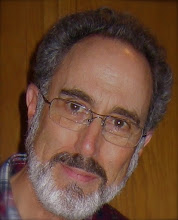Short Story/Novella -- Dreamer
Theme
Man is descending into madness (catatonic schizophrenia). His recurring nightmare of being swallowed up by blackness is a metaphor for his advancing mental disease.
The man is 22. He is in a state mental facility. He is seen by a psychiatrist who has him start keeping a journal so he can better describe his experiences and feelings when he has his sessions with her. After several sessions, she prescribes medication [Thorazine and Lithium] and after several additional sessions she has him released, with the proviso that he continues therapy on an outpatient basis. She provides him with a cell phone [a prepaid “Go phone”] he can use to call her office in an emergency. Back in the environment from which he came, he soon stops taking his meds and begins once again to experience the symptoms that led to his initial hospitalization, only now the symptoms are more extreme and his grasp on reality is clearly tenuous. Ultimately, the man goes into a catatonic state from which it is clear he will not recover [he climbs down into the basement of a deserted house and is only found when the house is demolished]. The story is told via the man’s journal.
Background
John had an unhappy childhood. He believes that he was raised by his aunt, Jemma, who says she’s his mother. John believes Jemma’s brother, Jed, is his father, but Jed disappeared when John was just an infant and too young to have any memory of him. When John is old enough to ask about his father, Jemma just tells him “You don’t have a father,” and won’t elaborate. John may be making all this up, including his researching birth certificates and other documents to discover who his father is, but some of it may be real.
As a young boy, John has recurring dreams of being suffocated by a mysterious blackness that seems to swoop down around him. He interprets this eventually as being “buried alive.” One night he awakes to find his aunt/mother standing over him with a pillow clutched to her chest. She leans over him and places the pillow under his head to prop him up because she claims he’s “stuffy.” [Was she going to smother him? Or is this a sign of John’s paranoia?]
John comes to believe that his father murdered his real mother when John was a few days old and tried to bury John alive with his dead mother. He thinks that his aunt discovered her brother burying the dead mother and infant, and knocked out the brother with the shovel. She saved the baby John and buried the mother. John believes that Jemma has her brother chained in the basement of the house he dreams about.
John believes that his real father, Jed, is mentally disturbed and that John has inherited his mental problems from his father. He may be right, but Jed is a figment of John’s imagination. John reasons that Jed was at one time admitted to a mental facility, and he contacts a number of places to see if he can identify him. He eventually locates the hospital where he himself was admitted and goes back there. He confuses his own experience of the place with Jed’s. John believes that Jed was released in the care of his sister, and that Jed met John’s real mother in the mental facility. They kept in touch and when she got out she went to him, pregnant with Jed’s child. He thinks Jemma let her stay because of this.
Jemma dies when John is 23. He discovers her maiden name going through her papers. He also learns of the house where she lived when he was born – the house where he believes his father is still chained in the basement.
John has recurring dream about going to a house, entering and climbing down stairs and experiencing a sudden blackness swoop around him. In the end, he goes to this house [is he going here to rescue Jed?] without fully realizing that it’s the house in his dream. The description of the house is the same, the day is the same, the sensations he feels are the same right up until the blackness descends on him.
Therapist [Dr. Esther Baryavson – she pronounces her name “Bar Yavson”] sees John at a state run psychiatric facility.
The psychiatrist doesn’t hear from John for several months, then he contacts her [using his cell phone] in a state of extreme distress. He’s frozen with terror in some dark place. He can’t tell her where, but she has the police trace the call. They go to the location and find a deserted house, but no John. Their description of the house fits the description John gives of the house in his nightmare.
Schizophrenia
The symptoms of schizophrenia are generally divided into three categories, including positive, disorganized and negative symptoms.
Positive Symptoms, or "psychotic" symptoms, include delusions and hallucinations because the patient has lost touch with reality in certain important ways. "Positive" as used here does not mean "good." Rather, it refers to having overt symptoms that should not be there. Delusions cause the patient to believe that people are reading their thoughts or plotting against them, that others are secretly monitoring and threatening them, or that they can control other people's minds. Hallucinations cause people to hear or see things that are not there.
Disorganized Symptoms include confused thinking and speech, and behavior that does not make sense. For example, people with schizophrenia sometimes have trouble communicating in coherent sentences or carrying on conversations with others; move more slowly, repeat rhythmic gestures or make movements such as walking in circles or pacing; and have difficulty making sense of everyday sights, sounds and feelings.
Negative Symptoms include emotional flatness or lack of expression, an inability to start and follow through with activities, speech that is brief and lacks content, and a lack of pleasure or interest in life. "Negative" does not, therefore, refer to a person's attitude, but to a lack of certain characteristics that should be there.
Schizophrenia is also associated with changes in cognition. These changes affect the ability to remember and to plan for achieving goals. Also, attention and motivation are diminished. The cognitive problems of schizophrenia may be important factors in long term outcome.
Borderline Personality Disorder (BPD)
BPD is characterized by impulsivity and instability in mood, self-image, and personal relationships. It is fairly common and is diagnosed more often in females than males.
Individuals with BPD have several of the following symptoms:
- marked mood swings with periods of intense depression, irritability, and/or anxiety lasting a few hours to a few days;
- inappropriate, intense, or uncontrolled anger;
- impulsiveness in spending, sex, substance use, shoplifting, reckless driving, or binge eating;
- recurring suicidal threats or self-injurious behavior;
- unstable, intense personal relationships with extreme, black and white views of people and experiences, sometimes alternating between "all good" idealization and "all bad" devaluation;
- marked, persistent uncertainty about self-image, long term goals, friendships, and values;
- chronic boredom or feelings of emptiness; and
- frantic efforts to avoid abandonment, either real or imagined.
The causes of BPD are unclear, although psychological and biological factors may be involved. Originally thought to "border on" schizophrenia, BPD also appears to be related to serious depressive illness. In some cases, neurological disorders play a role. Biological problems may cause mood instability and lack of impulse control, which in turn may contribute to troubled relationships. Difficulties in psychological development during childhood, perhaps associated with neglect, abuse, or inconsistent parenting, may create identity and personality problems. More research is needed to clarify the psychological and/or biological factors causing BPD. The field is also actively looking at genetic vulnerabilities.
Online Screening for Personality Disorders
Answer YES to the following questions ONLY if they have been present over a long period of time causing distress or impairment in functioning
1. Do you suspect that others are exploiting, harming or deceiving you?
2. Do you persistently bear grudges and not forget insults or injuries?
3. Do you almost always choose solitary activities?
4. Do you feel indifferent to praise or criticism of others?
5. Do you experience recurrent strange day dreams or fantasies?
6. Do you experience magical thinking that influences your behavior?
7. Do you repeatedly get into conflicts with the law?
8. Before age 18, have you been cruel to people or animals?
9. Do you have a pattern of unstable and intense relationships with others?
10. Do you have continuous feelings of emptiness?
11. Do you feel uncomfortable in situations where you are not the center of attention?
12. Are you easily influenced by others or are you suggestible?
13. Are you generally envious of other people?
14. Are you preoccupied with unlimited success or ideal love?
15. Are you unwilling to get involved with people unless you are certain of being liked?
16. Do you view yourself as socially inept, personally unappealing or inferior to others?
17. Do you have a difficulty making everyday decisions without an excessive amount of advice and reassurance from others?
18. Are you preoccupied with fears of being left to take care of yourself?
19. Are you preoccupied with details, rules, lists, order, organization, or schedules?
20. Are you such a perfectionist that it interferes with your work?
Side Effects of Medications
First-generation antipsychotic medicines [such as Thorazine] can cause problems with your movements that are mild to severe.
Mild movement problems include restlessness, tremors, and rigid muscles. You can stop these problems by taking a smaller dose of the medicine or by no longer taking the medicine. Your doctor may also be able to prescribe another medicine to block the movement problems.
A more severe movement problem is tardive dyskinesia, which causes unusual, uncontrollable body movements. These movements include facial grimacing or eye-rolling.
It is important to have your blood monitored regularly when taking these medications.
Other serious side effects include:
- Allergic reactions (skin rash, hives).
- Decreased white blood cell count (found by monitoring your blood levels while you are taking the medication).
- Neuroleptic malignant syndrome, which includes a high fever and irregular heartbeat.
- Seizures.
- Constant movement.
- Muscle spasms, especially in the neck.
- Abnormal heartbeat (arrhythmia).
- Liver problems.
- Low blood sugar (hypoglycemia).
- Frequent urination.
- Worsening of psychotic symptoms, such as hallucinations.
- Other common, mild side effects include:
- Drowsiness.
- Low blood pressure.
- Blurred vision.
- Constipation.
- Loss of appetite, nausea, or vomiting.
- Shaking, stiff muscles, and slow movement
Common side effects of lithium carbonate [brand name Lithane] include:
- Nausea.
- Loss of appetite, feeling of fullness or swollen stomach, and/or stomach upset.
- Dry mouth, increased thirst, and increased urination.
- Headache, slight memory loss, or confusion.
- Sensitivity to cold.
- Tiredness and sleepiness.
- Weight gain.
- Slight hand tremor.




















